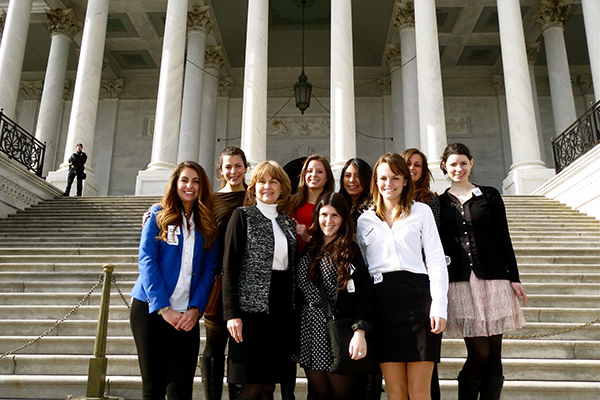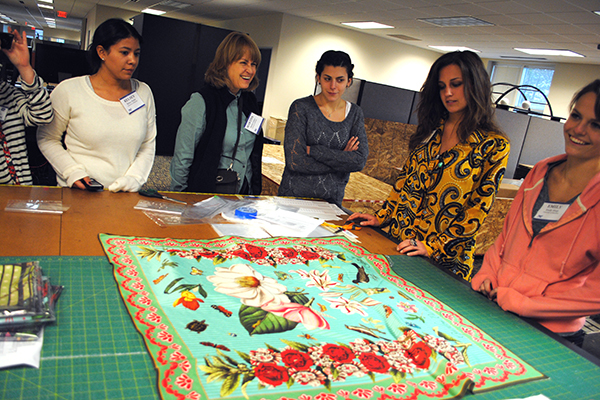


Politics of fashion
Students travel to D.C. and North Carolina to study trade policy, textile industry
9 a.m., March 28, 2013--You don’t have to look farther than your shirt label to see the apparel industry’s global network, but for a handful of fashion students, understanding how a “made in China” garment makes its way into the United States is a far more complex — and fascinating — process.
Participating in a novel domestic study abroad, eight undergraduates spent the 2013 Winter Session in Washington, D.C., and North Carolina, where they gained a behind-the-scenes look at government’s role in trade policy and a firsthand account of America’s textile industry.
Campus Stories
From graduates, faculty
Doctoral hooding
With the average tariff running between 5 and 30 percent, “everybody has a position and it’s not always the same,” explains Martha Carper, assistant professor in the Department of Fashion and Apparel Studies. “Political decisions affect the economies of countries and the lives of individuals who live and work in communities across the globe, from China, to Mexico, to the U.S.”
To better learn how governments impact the apparel industry, students met with international trade specialists, economic counselors of foreign embassies and leaders of national trade organizations.
They discussed the Fashion Piracy Bill with the sponsoring senator’s staff member, and even negotiated a mock free trade bill from the Senate floor, making recommendations to a fake pending agreement that the administration had submitted for congressional approval.
“We had actual Senate staff members participating and coaching us throughout the process,” wrote Morgan Hyman in the student’s blog. “Overall, it was amazing being apart of the mark up because we learned so much that could have never been taught to us in a classroom.”
Their weeklong trip in the nation’s capital was followed by a two-week stay in North Carolina, widely regarded as the hub of the country’s textile industry.
There, they received a full crash course on product development — from defining a company’s target market and the way the product should fit, to determining the way the product will be manufactured, constructed and priced.
Students also met with high-level industry leaders, such a vice president from VF Corporation (which owns such brands as Nautica, The North Face and Wrangler) and the CEO of International Textile Group. They also toured numerous factories, including the Cone Denim factory, the oldest functioning denim factory in the world, which produces denim for Anthropologie, Blue Lab and others.
“The purpose of this trip was to study the industry firsthand, as well as the government’s role in determining, to a great extent, the future of the apparel industry,” says Carper. “These decisions are being made, and our students can become part of the national policy that will shape the textile and apparel industry.”










